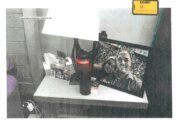Tracking leads to weight loss: Why you might want a food tracking app.
Whether your goal is to lose weight or improve your health, cut back on added sugar, fat or sodium, tracking your calories and nutrients can be a very effective strategy.
“Tracking can be a great way to see where there are opportunities to make tweaks in your diet to help you hit nutrition targets such as more fruits, vegetables, fiber or whole grains and identify unhelpful foods and eating habits that contribute to weight gain,” says Samantha Cassetty, a New York-based nutrition and wellness expert and co-author of “Sugar Shock.”
A commitment to tracking your calorieswith one of the better food tracking apps or a food diary can be very enlightening and motivating because a lot of people eat mindlessly without realizing what or how much they eat. Insights can also be gained on how your diet impacts energy levels, workouts and sleep.
When weight loss is your goal, and let’s face it, most adults want to shed some pounds, certain behaviors, such as self-monitoring, have proven to be beneficial.
The best food tracking apps have been shown to make an impressive impact in achieving weight loss. Studies show that tracking food intake or self-monitoring, had the greatest impact on weight loss compared to physical activity and weighing-in regularly.
A lot of people probably don’t realize what they’re putting into their bodies on a daily basis. Taking the time to gather this information can “help you get a better understanding of what you’re actually eating and drinking every day,” says Veronica Niedzinski, a registered dietitian with National Jewish Health in Denver.
If you prefer to keep track on your own, the simple art of writing down what you eat is a powerful way to keep calories in check.
Choosing the best calorie tracker apps for weight loss
Tracking food intake and losing weight is made easier with all of the websites and food tracking apps that are available for most smart phones. There are two main factors to think about when trying to select an app that works for you.
“First, evaluate how large and how accurate the database is in the app,” advises Samantha Cochrane, a registered dietitian at the Ohio State University Wexner Medical Center in Columbus. “Many apps have a verification process for entries that will help in making sure what you’re choosing best matches what you’ve actually eaten. More choices mean it’s more likely to be an easier task to log your foods.”
Not all of the apps are user friendly and some are less accurate than others. Choose the one that works best for you and fits your needs. Cassity recommends trying out a few of the free versions to see which interface and reports you like best.
Second, consider which nutrients you’re trying to track.
“For many people, it’s calories, and lots of apps are tailored to this,” Cochrane explains. “But for others I work with, it might be protein, fiber, saturated fat, sodium, etc., that they’re tracking as they work toward other health goals.
Beyond food and nutrition, some apps enable you to “track sleep, water intake, daily steps and other metrics, like blood sugar or blood pressure” says Cassetty.
Best calorie tracker apps for weight loss
To identify the best nutritional-tracking apps, we looked to user-friendly apps that allow you to track calories and other nutrients while also providing access to a comprehensive database of food items. Community support and features such as restaurant menus and recipes are additional AI features that enhance the overall tracking experience.
There are several excellent food and nutrition tracking apps available, each with its own unique features and benefits. Here are 13 of the best ones in no particular order:
Cronometer: best app for micronutrient tracking
Pros
— Encourages you to log exercise and biometrics, which syncs with fitness apps
— Has a fasting timer
— Ideal for specific diet restrictions such as keto or vegan diets
— Allows users to add health data (sleep, activities, body fat %, etc.)
— Considered one of the most accurate nutrition apps
Cons
— Free version contains ads (which can be removed with a paid subscription)
— Many tracking options can be overwhelming for some people
— Home recipes can only be added on the website, not the app
— No social community
— Price: Free basic plan with upgraded features for $8.99/month or $49.99/year
Key features
This app is a favorite of many registered dietitians, including Cassetty. Cronometer’s free app allows you to log your meals, track micronutrients (vitamins and minerals) and macronutrients (fat, carbs and protein), in addition to other features. Cronometer syncs with various activity trackers, including Fitbit, Strava and Garmin.
Cronometer’s main difference from other calorie-tracking apps lies in the robustness of the data related to micronutrients that it collects and supplies. While many calorie-counting apps only track the number of calories, carbs, fats and proteins in foods and meals, Cronometer drills down in more detail the many other vitamins and minerals that constitute the food you eat each day.
The company offers a free version of the app. For paying customers, there is a higher-tier gold account that removes advertisements and provides additional features, such as long-term data charts and reports, custom biometrics, recipe sharing and more. In addition, the company offers a professional version designed for nutritionists, dietitians, schools, hospitals and research teams that costs $39.99 per month.
Calorie Counter by FatSecret: best app for fast calorie tracking
Pros
— Free
— Robust community forum that offers support and connection to others
— Access to recipes
— Ability to track restaurant meals
— Large food database and barcode scanning
Cons
— Some users have reported difficulty in syncing across devices
— Free app contains ad content
Price: Free
Key features
The Calorie Counter by FatSecret is is a comprehensive food tracking app that is 100% free and bills itself as the “fastest, easiest calorie-counting app.” It offers a community component that’s half-forum and half-social network to help support your motivation to lose weight. Daily calories, carbohydrates, protein and fat are displayed on the home page for each meal, at the end of the day and monthly — an ideal feature to help dieters stay on track and meet health goals.
The app includes a food diary to log your meals, set goals and provide access to healthy recipes and nutritional information from foods, brands and restaurants. It also includes an exercise diary, so you can track calories burned, and it provides a weight chart and journal where you can record your progress.
Lose It!: best app for access to a large food database
Pros
— Free app includes community support and weight loss programs
— Large food database including restaurants and barcode scanning
— Simple and easy-to-use, ideal for beginners
— Includes an intermittent fasting tracker
— Snap It feature tracks foods in photos
Cons
— Advanced nutritional tracking information only available with paid subscription
— Difficult to add home recipes
— Does not track vitamins, minerals or added sugar
Price: Free basic plan with upgrade option to premium for $39.99/year
Key features
Lose It! was founded in 2008 to make calorie counting simpler. One of the first nutrition-tracking apps available, Lose It! has grown to contain a vast database of more than 32 million foods and exercises. However, reports are less detailed than some other apps so you may not be able to track added sugar, for instance. Look for check marks on foods and nutrients to confirm accuracy and completeness.
Many of the features in Lose It! are available for free, such as personalized weight loss plans and community support, where you can discuss weight loss and nutrition goals with other users. Snap it allows users to take photos of foods, confirm the foods and serving sizes and track it. Serving sizes are easily adjusted with a single swipe.
For $39.99 per year, you can access the premium membership, which features additional bells and whistles, such as advanced nutrition and exercise-tracking tools, to help keep your diet on track.
MyFitnessPal: best app for tracking packaged food items
Pros
— Huge food database and barcode scanning feature for packaged foods
— Camera feature that lets you snap a picture of your food. The app then identifies the food and calculates its nutrients.
— Robust blog with information and videos
— Users can build a personalized food database using your own recipes
— Shows progress toward goals
— Menu information from numerous restaurants
Cons
— Serving sizes in the database difficult to edit
— Advanced features unlock with a paid subscription, which is more expensive than some other apps
— Barcode scanner limited to premium subscription
— Unable to track added sugar and most vitamins and minerals
Price: Free basic plan with two tiers of premium upgrades at $19.99/month or $24.99/month
Key features
MyFitnessPal has a large database and simple interface. The app guides users through an initial setup that asks basic questions about height, weight, activity level and goals. You’ll also be prompted to set up an account. Once you have, the app provides a daily calorie intake goal to help you meet your desired rate of weight loss, which it doesn’t let you set higher than 2 pounds per week. The food diary and exercise log are well-designed and easy to use, showing how many calories you have burned through exercise.
Users can scan a barcode on packaged food, and a handy camera-enabled feature allows you to scan your actual plate of food. The app then recognizes the type and portion of the food you’re eating and adds those to your list.
MyFitnessPal offers free features, including a food diary to track what you eat and a searchable food database of more than 14 million items. You can build your own personal food database and log your meals and exercise. Discussion forums are also available, along with a personalized diet profile. This version is ad-supported.
The premium membership offers more precise tracking of macronutrients such as fiber. This ad-free version is free for the first month, but users will have to purchase a subscription plan to continue after that trial period ends.
Lifesum: best app for holistic self-care
Pros
— Users can build meal plans for periods ranging from seven to 21 days
— Handy barcode scanner for packaged foods included in free plan
— Considers holistic health goals as well as calories and weight loss
— Very easy to use with extraordinary visuals
— Healthier meal choices are encouraged with the food and meal rating system
Cons
— Limited features available in the free version of the app
— Individualized meal plans only available with premium subscription
Price: Free basic plan with tiered premium plans at $49.99 for 1 year; $14.99 for 3 months trial and $7.99 for 1 month trial
Key features
This self-care app, from Stockholm-based digital health company Lifesum, started as a simple calorie tracker but has since evolved into a more robust tracking and lifestyle adjustment app. Users can personalize and record their food choices, activities, hydration and other health factors.
The app starts users with a quiz to determine the best diet plan for their preferences and lifestyle, then offers a chance to build a meal plan. A wide variety of meal plans are available to choose from, including intermittent fasting, keto, vegan, Mediterranean and more. You can also access hundreds of easy-to-cook recipes, along with nutritional values and shopping lists.
Lifesum is free to download and offers limited features before you have to pay anything, including a review of total calorie, carbs, protein and fat intake per meal. To unlock all of its options, you’ll have to upgrade to a premium subscription.
Calory: best app for time-crunched people
Pros
— Clean, simple, easy-to-use interface
— Syncs with both Android and Apple products and connects to iCloud storage
— Inexpensive paid subscription option
Cons
— Limited tracking available beyond calories
— Uses USDA database, which can be difficult to navigate
— No social community
Price: Free for the first three days then $3.33/month
Key features
Calory markets itself as the quickest way to count calories and track macros, hydration and all of your food intake. It uses clean and simple graphics to cut screen clutter and make it easy to see the most important details of your health-tracking journey.
A useful feature is the history tab, which shows foods and calories per meal and weekly, monthly and annual charts of caloric intake and weight changes. Reminders to log calories are helpful.
A free version is a good place to start with basic calorie tracking, but to unlock all the features available in the app, you’ll need to upgrade to Calory Premium.
MyNetDiary Calorie Counter: best app for ad-free tracking
Pros
— Comprehensive, customizable free version contains no ads
— Keto- and low-carb tracking plans available
— Paid subscription syncs with fitness trackers and other devices
— Easy to use free barcode scanners and pictures to guide accuracy in measurements
Cons
— Limited features available in the free version
— AI meal scanner only with premium subscription
Price: Free basic with premium subscription option at $8.99/month or $59.99/year
Key features
MyNetDiary describes itself as the “easiest food-logging and health-tracking” app, noting that users need to take fewer steps to log foods in its app than others.
MyNetDiary offers a keto diet-specific tracking app and a low-carb tracking app as well. The premium diet app offers exclusive recipes created by the company’s team of registered dietitians, easy tracking and guidance to help you stick with your goal.
As with other apps, MyNetDiary will guide you through a series of questions to determine your background and diet goals. Then it generates a daily calorie budget along with suggestions for movement to help you meet your target calorie ratio to support the weight loss you’re looking for. The app provides a scoring system that grades foods to offer helpful advice to motivate users to improve overall diet quality to help meet health goals.
MyNetDiary’s basic features are free, including access to numerous recipes and the ability to add your own personal recipes and calculate nutrient composition. The premium tier gives users access to additional nutrient and exercise planning tools; linking with fitness trackers; charts, reports and weekly analysis; blood glucose tracking for diabetes; prioritized technical support; and no ads.
WW: best app for accountability
Pros
— Affiliated with one of the longest-standing and most trusted companies in the weight loss space
— Daily check-in messages and expert guidance help keep users accountable
— Based on WW’s successful Points tracking system
— Options for one-on-one coaching support
— AI powered food scanner and ability to import Point-compatible recipes
Cons
Requires a membership in WW for full use of the app
Price: App download is free followed by $23/month, though promotions are often offered.
Key features
While WW (WeightWatchers) has been around since the 1960s, the advent of the smartphone has infused some high-tech assistance to the company’s tried-and-true approach to weight loss. These days, the WW app is a key component of how dieters engage with the company’s weight loss program.
WW makes liberal use of a “digital point system that is consumer-focused for more successful weight loss,” explains Antonette Hardie, a registered dietitian at the Ohio State University Wexner Medical Center. “Consumers log their points with different point systems through their app.”
The WW app allows users to track food, activity, water intake and sleep. You can use the search bar to look up specific foods and recipe recommendations with the app’s “What’s in Your Fridge?” feature. You can also find weekly meal plans that can take some of the guesswork out of eating well. The handy barcode scanner feature allows dieters to scan the barcode on packaged foods to find and save their points value.
New features include an AI powered food scanner that analyzes a photo of a plate or meal, and identifies the food and estimates the points. Import a recipe online and AI calculates the points.
In addition to the food features, the app offers exercise tracking to help users build healthy habits. Members can also connect with the company’s social network to build a community of supportive friends within the WW program.
To gain the full functionality of the app, you’ll need to join WW. The company offers several membership options, depending on the plan’s duration. Introductory offers are often available, which may provide up to six months free before the paid membership kicks in.
Fooducate: best app for learning better habits
Pros
— Permits users to track activity and water intake
— Offers dietary recommendations for specific medical conditions
— Customizes recommendations for specific diets
Cons
— Ranking of foods based on an A to D system could be triggering for some users with a history of disordered eating
— Short, three-day free trial period before paid subscription starts
Price: Premium subscription option of $49.99/year
Key features
This app styles itself as a nutritional coach in your pocket; it’s designed to help you understand which foods are best for your body and improve your health through mindful eating and good habits.
The app allows you to add meals and snacks, water intake and exercise information to track all aspects of health. It also allows you to scan the nutritional labels of what you’re eating to make it easier to quantify your intake. In addition, Fooducate provides a breakdown of macronutrients in foods and offers dietary recommendations for specific medical conditions, such as diabetes, heart disease and high cholesterol. It can be customized specifically for various eating patterns, such as the Mediterranean diet or the paleo diet.
Foods are scored from A to D depending on their nutritional value, and the app provides insight into why the food is scored that way to help guide healthier choices.
Fooducate also hosts a social media-style community so you can share your journey and learn from others who are using the app. A user-generated database of recipes can help you try new foods without getting off track with your diet, and the Fooducate blog has articles to help support healthy eating, exercise and weight loss. The podcasts offer tips and suggestions and can help you stay motivated.
The basic app is free and offers in-app purchase options. Fooducate Pro is an enhanced version of the free app.
Yazio: best app for intermittent fasting
Pros
— Can connect with a fitness tracker to count steps and activity
— Searchable database of more than 1,000 recipes
— Intuitive design and easy interface with calorie and nutrient tracking
— Available in multiple languages, making it useful when traveling
Cons
— Limited options in the free version for intermittent fasting timing and tracking.
Price: Free basic plan with premium subscription option of $34.99/year, though several discounts exist
Key features
A popular option in Europe, Yazio has recently been made available in the United States. The German-based app syncs with a variety of fitness and health apps to track both food intake and physical activity levels throughout the day.
Yazio supports calorie counting with a database of international and regional food items. It also helps track intermittent fasting periods with customizable fasting trackers. The app also offers more than 1,000 recipes.
Noom: best app for weight loss
Pros
— All foods fit, although in restricted amounts
— Focus on lifestyle changes that can be sustainable
— Offers tools that help track progress, including barcode scanner and photo logging
— Support from health coaches
Cons
— No fitness tracker
— Only paid products, more expensive than other apps
Price: There are no free plans but you can sign up for a free trial. Price depends on the length of the weight loss plan. A monthly auto-renewing plan costs $70. Additionally, Noom offers a Noom Med plan that includes access to weight loss medications, which has a different pricing structure.
Key features
Noom is a calorie tracker along with a paid membership app to help promote short- and long-term weight loss. It’s much more than a calorie tracker. There is an educational component addressing mindful eating and cognitive behavioral strategies to address overeating and to help users understand their eating habits.
A flexible calorie budget is built based on age, height, weight, gender and lifestyle. The app helps you customize meal plans with a focus on calories and nutrients. Noom users are encouraged to weigh-in daily, take part in weekly challenges, track progress and add more daily activity — in addition to tracking food intake.
Fig: best app for allergies and dietary restrictions
Pros
— Very helpful for managing food allergies and specialty diets (FODMAP, vegan, gluten-free)
— Customizable to personal preferences, food intolerances, allergies and dietary needs
— Creates personalized grocery lists of compatible foods
— Highly rated by users
— Easy to use barcode scanner identifies incompatible ingredients based on your profile
Cons
— Limited database, though increasing
— Only five scans per month with free app
Price: Free plan includes five scans per month and unlimited searches, or upgrade to Fig+ subscription at $5.99/month or $39.99/year
Key features
Fig is an app for individuals managing food allergies, intolerances or specialized diets like gluten-free, low FODMAP, vegan or dairy-free. With highly customizable features and clear ingredient analysis, Fig helps users make smarter grocery and dining decisions based on their unique dietary needs by using a barcode scanner focused on foods, ingredients, allergens, nutrition facts, sustainability ratings and individual dietary requirements.
Fig supports most diets and allergies. Multiple user profiles are supported, making it ideal for households with different dietary restrictions. The app displays compatible foods lists at over 100 grocery stores and restaurants along with shopping lists and meal planning. Fig+ offers unlimited scans, enhanced features and support.
Yuka: best app for choosing the healthiest foods
Pros
— Scans barcodes of foods and cosmetics for information on ingredients, food allergens and nutrition
— Rates products based on ingredients and nutritional values
— Creates shopping lists and personalized recommendations
— Suggests healthier alternatives
Cons
— The system used to determine the score of each item could be misleading.
— Foods are categorized as good or bad without context of the total diet
— Organic foods are falsely promoted as nutritionally superior
Price: Free basic version with a premium tier of $14/year
Key features
Developed in France in 2017, currently, it is estimated to have 55 million users worldwide and 23 million in the U.S. The company is completely independent without ads or brand sponsors. Yuka fosters a community of users who share experiences, opinions and support.
Yuka scores the product from 0 to100, based on a variety of factors including ingredients, calories, sugar, sodium, saturated fats, fiber and protein, nutritional values, additives, organic and health risks. 60% of the score is from nutrition, 30% from additives and a 10% bonus if it is organic. Users are guided to make informed decisions and better choices when scores are low.
“Organic foods aren’t automatically healthy, nor are they nutritionally superior to conventional foods. With prices of food already being so high, most people can’t afford to eat organic food” says Abby Langer, who does not recommend organic over conventional.
Langer also found a lot of misinformation and fear mongering around perfectly safe food additives. “This can cause confusion in consumers, and increase anxiety around food and eating,” she adds.
Cassetty agrees that the rating system “adds unnecessary fear, confusion, and avoidance of certain foods that are perfectly fine to eat.”
The system of identifying foods and good or bad can be problematic for individuals with disordered eating or foster an unhealthy obsession with only consuming perfect foods.
Keeping a food journal without an app
This option is best for the technologically averse.
Pros
— Always 100% free
— No ads
— No risk of data hacking
Cons
— Requires nutritional analysis and logging all data correctly, which may be a heavy lift on the user’s part
— May require a physical notebook and pen for tracking
— Any digital version needs to be developed and maintained by the user
You can always opt for a less fancy means of tracking your weight loss info, such as creating an old-school food journal or food diary by using a pen and notepad. However, because smartphones are largely ubiquitous these days, many people prefer digital tracking capabilities.
If you want to go digital without downloading an app, you can set up your own tracking system by using a Google doc, memo app or a WhatsApp group with just yourself. That way, you can easily update your food tracking on your phone in real-time without the need for a third-party app. This lower-tech approach may also be useful if you’re concerned about your personal information being hacked or misused.
Weight loss is about more than tracking calories.
While nutrition apps and tracking options are useful tools that can help with weight loss, it’s important to remember that not all calories are the same. For example, 10 plain M&Ms and a regular-sized red bell pepper have similar caloric values. Naturally, a red pepper has a lot more nutritional benefits than a handful of candy. Calories matter, but they aren’t the only factor that dictates whether you lose or gain weight.
“Health is more than what we eat. It also entails how we speak to ourselves (positively or negatively), sleep duration and quality, stress management, activity levels, the quality of relationships, and access to healthcare and health-supporting practices,” says Cassetty. “Tracking can be a low-cost way to assess your behaviors, but one-to-one or group support can also help you change your behaviors and reach your goals”.
Using nutritional tracker apps for lasting behavior changes
Lastly, Cochrane notes that calorie-tracking apps aren’t meant to be used forever; rather, you should use them as a tool to learn how to improve your diet and build healthier habits.
“Eating can be very habitual, so if we take the time to pay a little closer attention to how and what we eat by tracking, it gives the opportunity to get more insight into how close or far we are to meeting certain nutrition goals,” she says.
Cochrane also cautions that nutrition-tracking apps “should not be used to police your food choices. I often encourage people to track at the end of their day and use it as a tool of reflection, rather than using it to make choices in the moment.”
She adds that it’s not always best to start using the app right as you’re first trying to make behavior changes.
“If the behaviors you change are only tied to you tracking what you eat,” she says, “it’s going to be really challenging to stop tracking and keep up the change.”
Frequently asked questions about food tracking apps
Will a calorie-counting app help me lose weight?
A calorie-counting app can help you lose weight, as it can provide valuable insight into what you’re eating and where you may be able to cut back.
Are there free calorie-counting apps?
There are dozens of free calorie-counting apps available online. Many are ad-supported, and some may have limited features available in their free versions. However, most offer the basic calorie-counting capabilities that can help jump-start a weight loss journey.
Can you recommend good personal training apps?
Personal training apps are a little different from calorie-counting or food-journaling apps. There is a whole constellation of personal training apps out there that offers all manner of fitness and exercise support programming.
Popular ones include Future, Caliber, Joggo and CENTR. Sport-specific apps also exist, with the Peloton App being a key one aimed at cycling and spinning, the Sweat App for pilates, MySwimPro for swimming workouts and HIIT Fitness Coach for high-intensity interval training workouts.
Bottom line
Ultimately, the best food and nutrition tracking app for you will depend on your specific needs, preferences and goals. Seek out features that support your goals and are user friendly such as barcode scanning, recipe importing, nutrient summary and more. Some apps include the most useful features for free while others require a paid subscription. It’s a good idea to try out a few different apps to see which one works best for you, fits into your lifestyle and budget.
Keep in mind that although the best food tracking apps or calorie counters have the potential to be an effective weight-loss tool, they can also trigger or heighten eating disorder symptoms.
“If you’ve ever had an eating disorder or have had a preoccupation with weight, calories, dieting or excessive exercise to burn calories, it’s probably not appropriate to track your intake” says Cassetty. Preliminary research has documented associations between food tracking apps and eating disorder symptoms.
13 best apps for calorie and food tracking:
— Cronometer
— Calorie Counter by FatSecret
— Lose It!
— MyFitnessPal
— Lifesum
— Calory
— MyNetDiary Calorie Counter
— WW
— Fooducate
— Yazio
— Noom
— Yuka
— Fig
More from U.S. News
12 Health Benefits of a Plant-Based Diet
Best and Worst Foods to Eat for an Upset Stomach, According to Dietitians
Best Meal Delivery Services for Prepped Meals in 2023
The 13 Best Nutrition-Tracking and Calorie-Counting Apps to Help You Reach Your Health Goals originally appeared on usnews.com







